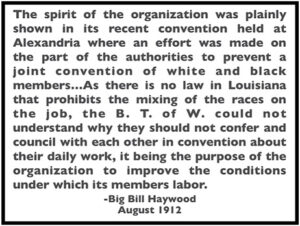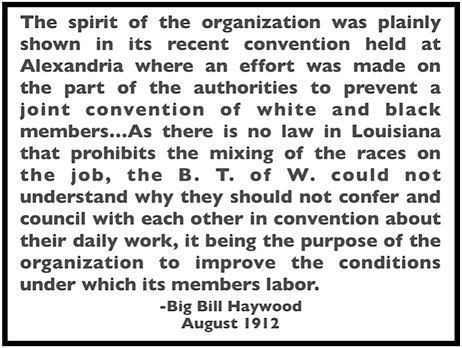 —————
—————
Hellraisers Journal – Wednesday January 22, 1913
Merryville, Louisiana – B. T. W. (I. W. W.) Battles Peonage
From the Alexandria Lumberjack (Louisiana) of January 16, 1913:
—–
 —————
—————
Hellraisers Journal – Wednesday January 22, 1913
Merryville, Louisiana – B. T. W. (I. W. W.) Battles Peonage
From the Alexandria Lumberjack (Louisiana) of January 16, 1913:
—–
 —————
—————
Hellraisers Journal – Saturday October 26, 1912
Calcasieu Parish, Louisiana – Fellow Workers on Trial for Their Lives
From The Wheeling Majority of October 24, 1912:
—————
The Grabow “Conspiracy”
———-Alexandria, La., Oct. 24.-(Special.)-at 11:40 a. m., Monday morning, October 7th, in the District Court of Calcasieu Parish, Louisiana, Judge Winston Overton presiding, began the trial of President A. L. Emerson, Organizer Ed. Lehman, John Helton, R. H. Chatman, Edgar Hollingsworth, Louis Brown, Jack Payne, Ed Ezell and C. Havens, the nine members of the Brotherhood of Timber Workers the Southern Lumber Association has picked out to victimize in order to crush Unionism throughout the South.
The whole of the first day was taken up in preparation and in a fight made by Judge E. T. Hunter, leading counsel for the defense, for time, about two weeks, in which to ask the Supreme Court of Louisiana for a writ of mandamus setting aside the District Court’s order severing the cases of the nine men on trial from the balance of their 58 brothers who had been indicted jointly with them for “conspiracy to murder.” The Court admitted Judge Hunter’s contention correct law, but refused to grant the petition, mainly on the round that it would be impossible to try the 58 accused all together, because the law gave them 1044 challenges.
Judge Hunter pointed out to the court that that was not the fault of the accused, that they had not indicted themselves and were not responsible for the blunders of District Attorney Joseph Moore or for those of the prosecuting attorney for the Southern Lumber Operators Association, Congressman A. P. Pujo, but the Court still refused and ordered the nine men to trial for the murder of the lumber trust gunman, A. P. Vincent, who was killed in the battle at Grabow, La., when the mass meeting of the Brotherhood and its farmer allies was fired on from ambush by the private thug army of the Association on the 7th of last July.….
[Emphasis and paragraph breaks added.]
 —————
—————
Hellraisers Journal – Saturday August 3, 1912
Brotherhood of Timber Workers Organizing Campaign in Louisiana
From the International Socialist Review of August 1912:
[Part II of II]
Before the campaign of organization [Brotherhood of Timber Worker] now inaugurated by the Industrial Workers of the World is closed the lumber barons of Dixieland will have learned that it is impossible to fell trees with rifles and saw lumber with six shooters.
It should be mentioned here that of the nine men arrested four are non-union men, two of them, John and Paul Galloway, being owners of the Lumber Company. All are charged with murder. This, perhaps, indicates that the Trust has not entirely corralled the officialdom of Louisiana. It is certain that they are in bad repute with the business element in nearly all of the towns as their commissaries have been the means of controlling nearly the entire earnings of their employees, who are compelled to trade with the companies or lose the only means they have of making a living.
To maintain their absolute control of the camps the lumber companies, with the aid of their thugs, patrolled the towns, in some places inclosures were built around the mills and shacks. Notices were posted warning away union men, peddlers and Socialists.
Only a few days ago, H. G. Creel, one of the Rip-Saw editors on a lecture tour, was roughly handled at Oakdale and DeRidder, La. He was compelled to leave the first-named place, being threatened and intimidated by gun-men.
The small merchant realizes that if the workers are allowed to trade where they choose some of their money would pass over their counters and they know if wages are increased there would be a corresponding increase in their day’s receipts. This will account for the fact that the small business man and farmer have given their sympathy and a measure of support to the growing union of timber workers.
Arthur L. Emerson and Jay Smith, both Southern born, are the men around whom interest centers. They are the men who organized the Brotherhood of Timber Workers. Emerson had made two trips to the West-one to the Lumber District to the Southwest and the other to the Northwest. It was during the time that he worked with the lumber jacks of the Pacific Coast that he learned the need of organization. This thought was especially developed when he came in contact with the Lumber Workers’ Union of St. Regis and other points in the Bitter Root Range of Mountains. Being a practical lumber jack and saw mill hand and mill-wright himself, he saw at once the discrepancy in wages between the Pacific Coast and the Gulf States and upon his return to Dixieland he immediately took up the burden of organizing the workers as the only possible means of bringing up their wages and conditions to the level of the already too-low Western scale.
 —————
—————
Hellraisers Journal – Friday August 2, 1912
Lake Charles, Louisiana – A. L Emerson, President of B. T. W., in Jail
From the International Socialist Review of August 1912:
[Part I of II]
A. L. EMERSON, President of the Brotherhood of Timber Workers, is in jail at Lake Charles, La. He was arrested following the shooting at Grabow, La., where three union men and one company hireling were killed outright and nearly two score of men were more or less seriously wounded.
The shooting is the outcome of the bitter war waged against the members of the Brotherhood of Timber Workers by the Lumber Trust for the last eighteen months. The scene of the tragedy that occurred on Sunday, July seventh, is a typical Southern lumber camp. The mill at this place is operated by the Galloway Lumber Company. In common with all others, it is surrounded by the miserable houses where the workers find habitation, the commissary store of the Company being the largest place of business in the towns. A strike has been on at this place since the middle of last May. The single demand on the part of the union men was for a bi-weekly pay day. Heretofore the pay days have been at long intervals-usually a month apart.
During the intervening weeks, when the men were in need of money to meet the necessities of life, they could secure advances on their pay but not in real money. They were compelled to accept Company Scrip payable only in merchandise and exchangeable only at the company commissary. If accepted elsewhere it is uniformly discounted from 10 to 25 per cent on the dollar.
In the commissary stores where the cash prices are always from 20 to 50 per cent higher than at the independent stores, the company has established another means of graft by making two prices-the coupon or scrip price being much higher than that exacted for real cash.
The conditions at Grabow can be used as an illustration of nearly all of the other lumber camps of the South.
The commissary store is not the only iniquity imposed upon the Timber Workers. For miserable shacks they [are] compelled to pay exorbitant rents; sewerage there is none; there is no pretense at sanitation ; the outhouses are open vaults. For these accommodations families pay from $5 to $20 a month. In one camp worn-out box cars are rented by R. A. Long, the Kansas City philanthropist, for $4 a month. Insurance fees are arbitrarily collected from every worker, for which he receives practically nothing in return, but whether his time be long or short-one day or a month-with the company, the fee is deducted. The same is true of the doctor fee and the hospital fee, which, in all places, is an imaginary institution. The nearest thing to a hospital that the writer saw was an uncompleted foundation at DeRidder, the place visited a few days prior to the Grabow tragedy. The gunmen and deputy sheriffs are an expensive innovation in the manufacture of lumber. These miserable tools are to be found everywhere and are used to browbeat and coerce the workers.